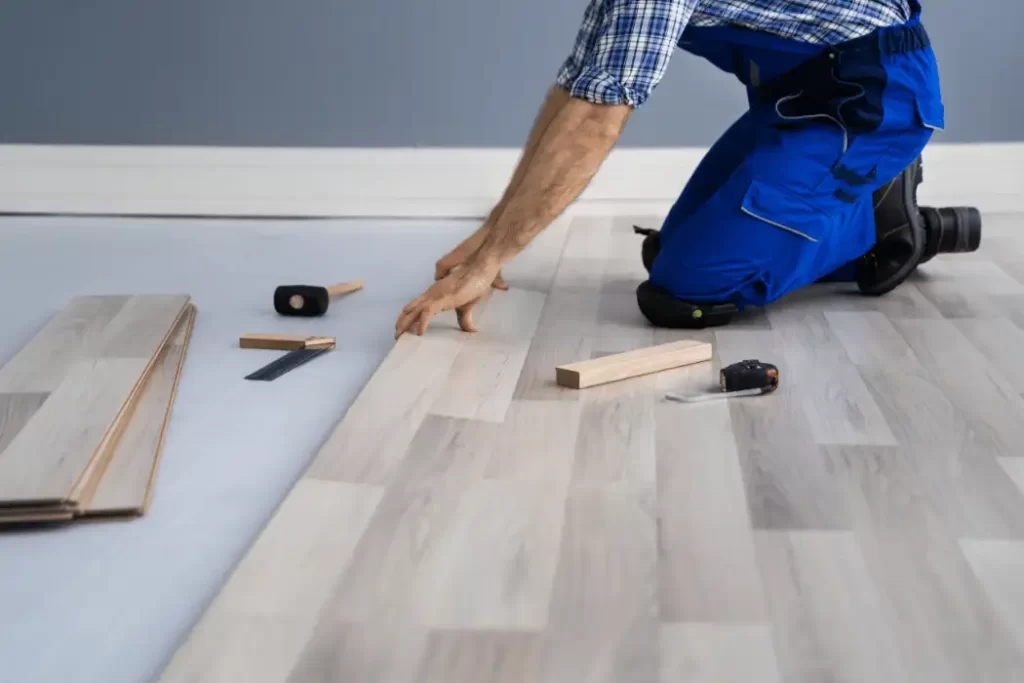The flooring in your home is one of the most important design decisions you will make. Not only does it affect the overall look and feel of your space, but it also impacts the functionality and durability of your home. With so many flooring options available, it can be overwhelming to choose the right one for your home. In this ultimate guide, we will discuss the most popular types of flooring and their pros and cons to help you make an informed decision.
Hardwood Flooring
- Hardwood flooring is a classic and timeless choice that never goes out of style. It is durable, long-lasting, and can be sanded and refinished multiple times, making it an excellent investment for your home. However, it can be expensive, and it is not ideal for areas with high moisture levels, such as bathrooms and basements.
Laminate Flooring
- Laminate flooring is a cost-effective and versatile option that mimics the look of hardwood, tile, or stone. It is easy to install and maintain, making it a popular choice for DIY projects. However, it is not as durable as hardwood or tile and can be prone to scratches and dents.
After months of planning and anticipation, the home renovation project finally began, transforming the outdated space into a modern and inviting oasis.

Tile Flooring
- Tile flooring is a popular choice for bathrooms, kitchens, and other high-traffic areas. It is waterproof, durable, and easy to clean, making it ideal for homes with kids and pets. However, it can be slippery when wet, and it can be challenging to replace a single tile if it becomes damaged.
Carpet Flooring
- Carpet flooring is a cozy and comfortable option that can add warmth to any room. It comes in a wide range of colors and textures, making it easy to match your decor. However, it can be difficult to clean and can harbor allergens and dust mites, making it a poor choice for people with allergies.
Vinyl Flooring
- Vinyl flooring is a versatile and durable option that can mimic the look of hardwood or tile. It is waterproof, easy to clean, and budget-friendly, making it an excellent choice for bathrooms and kitchens. However, it can be prone to scratches and dents and may not be as long-lasting as hardwood or tile.
Cork Flooring
- Cork flooring is an eco-friendly and sustainable option that is soft underfoot and absorbs sound. It is a good choice for people with allergies as it is hypoallergenic and antimicrobial. However, it can be prone to scratches and dents and may fade over time.
Concrete Flooring
- Concrete flooring is a modern and industrial option that is durable and easy to maintain. It is ideal for high-traffic areas and can be customized with stains, stamps, and dyes. However, it can be cold and hard underfoot and may require regular sealing to prevent stains and moisture damage.
Bamboo Flooring
- Bamboo flooring is a sustainable and eco-friendly option that is durable and easy to clean. It is a good choice for people with allergies as it is hypoallergenic and resistant to mold and mildew. However, it can be prone to scratches and dents and may fade over time.
When choosing the perfect flooring for your home, consider the style of your home, your budget, and the level of maintenance and durability you require. It is also essential to think about the functionality of the room and the amount of foot traffic it will receive. For example, tile flooring may be a good choice for a bathroom, but hardwood flooring may be better suited for a living room.
In addition to considering the type of flooring, you should also think about the color and finish of the flooring. Lighter colors can make a room feel larger and brighter, while darker colors can add warmth and depth. A matte finish can create a more natural and rustic look, while a glossy finish can add a modern and sleek feel.
It is also important to consider the installation process and cost of each type of flooring. Some types of flooring, such as hardwood and tile, may require professional installation, which can add to the overall cost. On the other hand, laminate and vinyl flooring are often designed for easy DIY installation, making them a more affordable option.
Maintenance and upkeep are also crucial factors to consider when choosing flooring. Hardwood and tile flooring may require occasional sealing or refinishing, while carpet and cork flooring may require regular cleaning and vacuuming. It is important to choose a flooring option that fits your lifestyle and maintenance preferences to ensure that it remains in good condition for years to come.
Finally, it is important to consider the environmental impact of your flooring choice. Sustainable options, such as bamboo and cork flooring, are becoming increasingly popular as people become more environmentally conscious. These options are renewable and often made from natural materials, making them a more sustainable choice for your home.
Conclusion
Choosing the perfect flooring for your home requires careful consideration of several factors, including style, budget, functionality, maintenance, and environmental impact. By weighing the pros and cons of each type of flooring, you can make an informed decision that will not only enhance the look and feel of your space but also ensure its durability and functionality for years to come.

